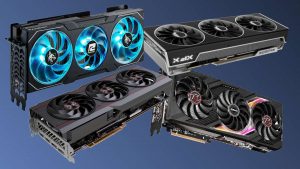Aside from a big step up in sequential throughput speeds, seemingly the common denominator for the latest PCIe Gen 5 SSDs is the need for beefy active cooling to rival an RTX 4090. Well, almost. But not so with the new Sabrent Rocket 5. Sabrent reckons it’ll do just fine with one of those slim-line cooling covers that comes with most motherboard M.2 slots.
If true, that’s particularly impressive given the new Rocket 5 not only uses the same Phison E26 controller chip as the bulk of existing Gen 5 drives, which tend to have massive heatsinks or even require active cooling. It’s also one of if not the fastest Gen 5 drives yet.
Sabrent is claiming 14GB/s reads for both the 2TB and 4TB variants of the drive, with writes coming in at 12GB/s. The 1TB model clocks in at 13GB/s for reads and 9.5GB/s for writes. In fact, Sabrent’s own testing puts the drive’s performance just over 14GB/s in CrystalDiskMark and up near 13GB/s for reads.
Theoretically, the PCIe Gen 5 spec allows for up to 16GB/s assuming a quad-lane interface. Some Gen 5 drives with the E26 controller only hit 10GB/s, including the Seagate FireCuda 540. Apart from firmware optimisations, the speed differential largely comes down to the specifics of the NAND flash being used by the drive.
Sabrent has released some early CrystalDiskMark performance numbers for the new drive. (Image credit: Sabrent)
The earliest Gen 5 drives used 1600MT/s flash chips, capping performance around 10GB/s. 2000MT/s NAND has since upped that to 12GB/s or thereabouts. Now Sabrent (via Anandtech) could be the first to roll out 2400MT/s NAND and thus achieve 14GB/s.
The Sabrent Rocket 5 doesn’t need an active cooler. But here’s one they made for it anyway. Hmmm… (Image credit: Sabrent)
Of course, you could argue it’s random access, not peak sequential throughput, that matters more. Here, the Rocket 5 is pretty impressive, too, with 1.4 million IOPS in both directions.
(Image credit: Future)
Best SSD for gaming: The best speedy storage today.
Best NVMe SSD: Compact M.2 drives.
Best external hard drives: Huge capacities for less.
Best external SSDs: Plug-in storage upgrades.
In practice, the CrystalDiskMark numbers Sabrent has released show that translates into a little over 100MB/s for 4K reads and getting on for 500MB/s for 4K writes.
For systems that lack a bundled cooling slab for their M.2 slot(s), Sabrent will in any case include a fairly large active cooler with the drive, which slightly undermines the notion that the Rocket 5 doesn’t need fairly intensive cooling.
Whatever, there’s no word yet on pricing, but the Rocket 5 should be out fairly soon. Hopefully, we’ll get our hands on one straight away for testing, with oven gloves to the ready, just in case.












